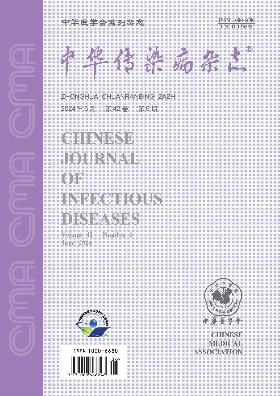采用24位点可变数目串联重复分型和孢子寡聚分型对河南省结核分枝杆菌进行基因型分析
引用次数: 0
摘要
目的了解河南省结核分枝杆菌的基因型。方法对2015年河南省不同地区采集的668株结核分枝杆菌临床菌株采用经典的24位点分枝杆菌穿插重复单元可变数串联重复(MIRU-VNTR)分型和孢子分型两种标准方法进行基因分型。结果668株分离株经孢子分型,可分为11个类群和35个模式。558株北京菌株中,546株为典型北京菌株,其余12株为非典型北京菌株。在110个非北京菌株中,8个为新菌株,其余102个非北京毒株分为10个家族。共有76个分离株属于T家族,其中T1家族59个,T2家族7个,T3家族10个。用标准的24位点VNTR将668株菌株分为550个基因型,其中508个为非聚类型,160个为42个聚类型。最大的集群包含21个菌株,其他集群包含2-20个菌株。结论北京株仍是河南省最常见的结核分枝杆菌。关键词:结核分枝杆菌;24位点分枝杆菌穿插重复单元可变数目串联重复;Spoligotping本文章由计算机程序翻译,如有差异,请以英文原文为准。
Genotypic analysis of Mycobacterium tuberculosis strains collected from He′nan Province by 24-locus variable-number tandem-repeat typing and spoligotyping
Objective
To investigate the genotype of M. tuberculosis in He′nan Province.
Methods
A total of 668 M. tuberculosis clinical strains collected in difference regions of He′nan Province during 2015 were genotyped by two standard methods, including classical 24-locus mycobacterium interspersed repetitive unit variable-number tandem-repeat (MIRU-VNTR) typing and spoligotyping.
Results
The 668 isolates were divided into 11 clusters and 35 patterns by spoligotyping. Among the 558 Beijing strains, 546 were typical Beijing strains and the other 12 were atypical Beijing strains. Among the 110 non-Beijing strains, eight were new strains and the remaining 102 non-Beijing strains were divided into 10 families. There were 76 isolates belonging to T family, including 59 of T1 families, 7 of T2 families, and 10 of T3 families. The 668 strains were divided into 550 gene patterns by standard 24-locus VNTR, including 508 un-clustered patterns and 160 clustered into 42 clusters. The largest cluster contained 21 strains, the other clusters contained 2-20 strains.
Conclusion
Beijing strain is still the most prevalent M. tuberculosis in He′nan Province.
Key words:
Mycobacterium tuberculosis; 24-locus mycobacterium interspersed repetitive unit-variable number tandem repeat; Spoligotyping
求助全文
通过发布文献求助,成功后即可免费获取论文全文。
去求助
来源期刊
自引率
0.00%
发文量
5280
期刊介绍:
The Chinese Journal of Infectious Diseases was founded in February 1983. It is an academic journal on infectious diseases supervised by the China Association for Science and Technology, sponsored by the Chinese Medical Association, and hosted by the Shanghai Medical Association. The journal targets infectious disease physicians as its main readers, taking into account physicians of other interdisciplinary disciplines, and timely reports on leading scientific research results and clinical diagnosis and treatment experience in the field of infectious diseases, as well as basic theoretical research that has a guiding role in the clinical practice of infectious diseases and is closely integrated with the actual clinical practice of infectious diseases. Columns include reviews (including editor-in-chief reviews), expert lectures, consensus and guidelines (including interpretations), monographs, short monographs, academic debates, epidemic news, international dynamics, case reports, reviews, lectures, meeting minutes, etc.

 求助内容:
求助内容: 应助结果提醒方式:
应助结果提醒方式:


